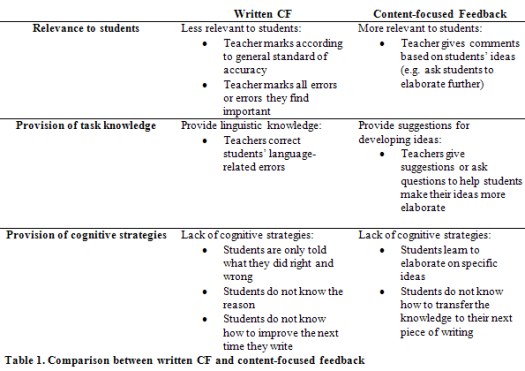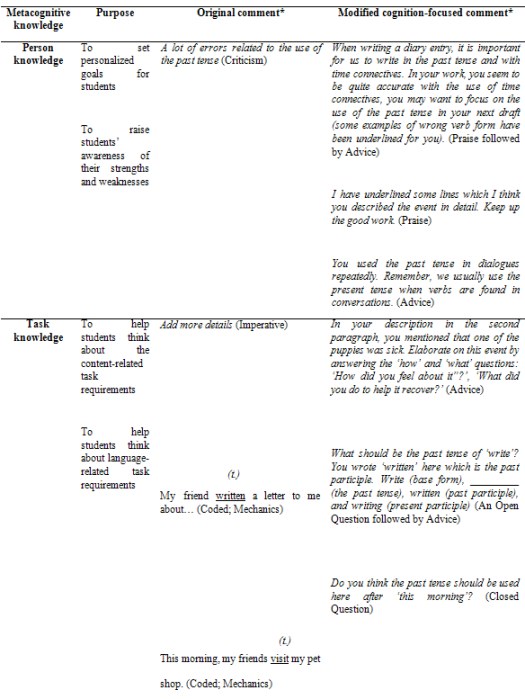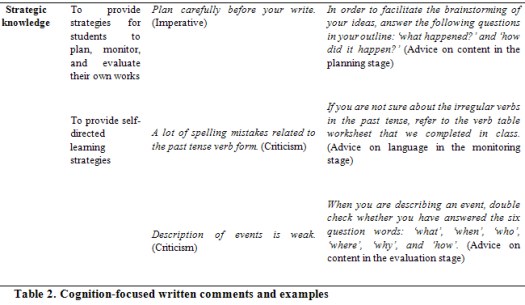Fostering Students’ Metacognitive Knowledge Through Written Comments
Ivan Chong, Hong Kong, People's Republic of China
Ivan Chong is currently teaching in a tertiary institution in Hong Kong. Apart from his teaching duties, he is an active speaker of teacher workshops and he has presented in conferences in Hong Kong, the UK, and Japan. He has recently published a paper in Assessing Writing. E-mail: ivancsw@icloud.com
Menu
Abstract
Current feedback practice in L2 writing
Metacognition and ESL writing instruction
Cognition-focused written comments
Conclusion
References
In the discussion of effective teachers’ written comments in L2 writing, much attention has been given to how these comments would lead to an improvement in students’ language proficiency and writing ability in general. Nevertheless, recent studies on students’ perception of teachers’ written comments have revealed limitations in these content-focused and form-focused comments, in particular their inadequacy in empowering students to do revision based on teachers’ suggestions, leading to a no-win situation. With this backdrop, in addition to the aforementioned practices of written comments, this article suggests a third approach to giving written comments in L2 writing which promotes students’ metacognitive knowledge in three ways: to think about their strengths and weaknesses (person knowledge), to think about the task requirements (task knowledge), to think about the strategies that are suitable for the students and the task(strategic knowledge), which would ultimately motivate students to respond to teachers’ comments.
Form-focused written corrective feedback (CF)
In the context of L2 writing, written CF is the predominant type of written comments given by teachers (Hyland & Hyland, 2006). L2 writing teachers more often than not burn their midnight oil to engage in this area of work which is referred to as ‘frustrating, gruelling and anxiety-ridden, tedious and unrewarding’ (Lee, 2009, p. 13). Despite the heavy workload, this feedback practice is still a commonplace because L2 writing teachers hold the perception that their students, unlike their L1 counterparts, need more language-related input (Ferris, 2004). Moreover, L2 writing teachers feel compelled to mark students’ errors comprehensively because of the expectation of parents and schools (Lee, 2009).
Even though written CF is practiced in most L2 writing classrooms, research does not have conclusive evidence to affirm its effectiveness (Bitchener, 2012). Studies have shown that written CF, especially when a comprehensive approach is adopted, is too overwhelming to L2 students and they become discouraged (Fazio, 2001). With the lowered self-esteem, students do not show improvement in language accuracy in their revised drafts, let alone their limited attempt to respond to teachers’ feedback (Truscott, 1996). Moreover, researchers who study written CF perceive teacher feedback to be inconsistent, unclear, and inaccurate (Lee, 2004). This causes confusion on the part of the students and thus, students are less willing to act on teachers’ feedback. The second reason that explains the limitations of written CF is grounded on SLA research. When acquiring new grammatical rules, it is a developmental process for students to internalize the rules to raise accuracy (Ellis, 1997). This nature of acquiring new linguistic knowledge suggests that it is not realistic to expect students to immediately acquire new linguistic knowledge through written CF; more importantly, students should be taught the strategies that could promote their self-regulated awareness to monitor their writing process. The last section of this article would propose a form of written comment that could equip students with the requisite metacognitive knowledge and strategies to maximize the benefits of written CF and improve their writing performance through self-regulation and monitoring.
Content-focused feedback
While a substantial body of studies is available concerning written CF, there is a paucity of research in the area of content-focused written feedback. L2 writing teachers go about giving content-focused feedback in the forms of: praises and criticism (Hyland & Hyland, 2001), questions (McGarrell & Verbeem, 2007), imperatives and suggestions (Leng, 2014). In spite of not being as commonly practiced as written CF, content-focused feedback and its pedagogical function have been confirmed in L2 writing research (Tom, Morni, Metom, & Joe, 2013).
Research investigating the effectiveness of content-focused feedback has similar findings that giving content-focused with a limited amount of form-focused feedback can lead to improvement in students’ writing performance (Leki, 1992). In a study investigating the perception of Pakistani graduates of content-focused feedback, it was found that students in general perceive the feedback as helpful to improve the quality of their ideas, especially when the focus was on conceptual clarity and coherence (Ghazal, Gul, Hanzala, Jessop, & Tharani, 2014). Nevertheless, some studies also report the setbacks of content-focused feedback which are due to the following reasons: teachers’ handwriting is sometimes not legible to students (Leki, 1990), students are more concerned about the grades than the comments (Burkland and Grimm, 1986), students only do mental notes on teachers’ comments but seldom revise their work based on the comments (Cohen, 1987).
Comparing the two lines of research, it could be seen that researchers have more conclusive evidence to support the effectiveness of content-focused feedback than form-focused written CF. One explanation is that teachers who give content-focused feedback employ a more comprehensive repertoire of feedback types, for example, praise, criticism, imperative, advice, open/closed question (Straub, 1997) to guide students’ thinking and facilitate their cognitive development. On the other hand, practitioners of written CF employ only direct or indirect feedback (Beuningen, Jong, & Kuiken, 2012) and focused or comprehensive feedback (Sheen, Wright, and Moldawa, 2009) when commenting on students’ language accuracy. These practices are not always conducive to the development of students’ cognition. First, they simply copy their teachers ‘model answers’ (as in the case of direct feedback) or they give up doing corrections because they do not know the answers (as in the case of indirect feedback). Second, when focused written CF is given, a discrepancy may exist between the teacher’s language focus and the students’. As such, students are not motivated to do revision. In comprehensive written CF, the red marks on the paper may be too overwhelming to the students and they lack the well-developed linguistic knowledge and lose the motivation to respond to those errors. Table 1 summarizes the comparison between the strengths and weaknesses of both types of written comments:

Metacognition, the cognitive process of thinking about one’s thinking (Stewart & Landine, 1995), has been conceptualized by Flavell (1976) into metacognitive knowledge and experiences. Metacognitive knowledge is further divided into three interrelated knowledge variables: person, task, and strategic knowledge. Research has proven that students who possess strong metacognitive knowledge are more successful learners (Devine, 1993). ‘Person knowledge’, also referred to by some as the ‘declarative knowledge’, is knowledge about one’s self, including one’s experience, belief, and self-esteem in a task or activity (Pintrich, 2002). ‘Task knowledge’ or ‘procedural knowledge’ denotes the knowledge that a learner possesses in relation to the execution and requirements of the task (Paris and Winograd, 1990). Lastly, ‘strategic knowledge’ or ‘conditional knowledge’ entails ‘knowledge of strategies for learning and thinking’ (Ellis, Denton, and Bond, 2014, p. 4017).
Literature about metacognition has shown consistent interest in its linkage with literacy education. In particular, how the development of metacognitive knowledge and strategies can be conducive to L2 students’ ability in reading and writing has been investigated. A study conducted by Lu (2006) investigated the metacognitive knowledge and writing performance of a group of Chinese English major students in a university and concluded that more competent writers were superior than others in terms of their metacognitive knowledge. In a Malaysian study conducted by Surat, Rahman, Mahamod, and Kummin (2014), it was found that the writing performance of 18 local secondary school students was not satisfactory because the majority of them failed to employ declarative and conditional knowledge when writing while none of them was able to use procedural knowledge. The findings from these studies echo with what other L2 writing researchers claim concerning the direct connection between metacognitive knowledge and students’ writing performance. Devine, Railey, and Boshoff (1993), after assessing the impact of metacognitive model on L1 and L2 students’ writing performance, conclude that there is a potential connection between the two. Devine (1993) even makes a forceful assertion that metacognition plays an even more vital role than language ability in L2 writing. Devine continues to explain that one inhibiting factor for students to make improvement in writing is because they do not set personalized goals, preventing them from critically responding to teachers’ feedback which is relevant to their goals.
It is conclusive from existing research that it is beneficial for L2 students to acquire metacognitive knowledge (person, task, and strategic knowledge) in order to improve their writing performance. At the same time, as reflected from the current practice of written comments in L2 writing context, written CF and content-focused feedback seem to cater to students’ task knowledge – linguistic knowledge and content knowledge without an adequate focus on the needs of individual students (person knowledge) and metacognitive strategies (strategic knowledge) that would increase the likelihood for students to apply what they learnt from teachers’ written comments to their next piece of writing. With the above constraints of current L2 feedback practice, I propose a third approach of written comments: cognition-focused written comments. Table 2 summarizes the major components of cognition-focused written comments. In the table, original comments given by a teacher on a Grade 7 writing question in Hong Kong: ‘Imagine you were the owner of a pet shop. Write a diary entry to describe an unforgettable experience.’ are included and the comments are modified to demonstrate how students’ self-regulation and awareness can be promoted through cognition-focused written comments:


Fostering person knowledge
This domain of cognition-focused written comments emphasizes the importance of setting learning goals for students that are related to both the writing task and the students’ performance (their strengths and weaknesses). According to Hattie and Timperley (2007), feedback that include specific goals can ‘promote goal-directed action, produce persistence at task performance in the face of obstacles, and favor the resumption of disrupted tasks even in the presence of more attractive alternatives’ (p. 88). Moreover, the setting of goals for students to improve in the next draft can develop a shared understanding of the success criteria between the teachers and students. With clearly stipulated goals (self-related and task-related) in written comments, students are more motivated to respond to the comments and make appropriate changes.
Fostering task knowledge
Even though written CF and content-focused feedback provide much information about the task requirements in the language and content domains, cognition-focused feedback utilizes such comment types as Advice, Open Question, and Closed Question to guide students’ thinking process and provide necessary knowledge for students to do revisions. For example, Thompson (1998) argues that in order for feedback to be effective, students need to posssess the necessary knowledge to act on the feedback. Referring to Table 2, the teacher originally used coded written CF (the code ‘t’) to identify tense-related errors. Nevertheless, the students may not posssess the knoweldge of the past tense form of ‘write’ (that may be the reason why he wrote ‘written’). In cognition-focused feedback, teachers can include the necessary knowledge for students to respond to this comment. For example, teachers can write down the different verb forms of ‘write’ to stimulate students’ memory of the past tense of the verb (Table 2).
Fostering strategic knowledge
A distinctive feature of cognition-focused feedback is the explicit provision of strategies that promote self-regulation (Zimmerman, 2000). These self-regulated strategies could be used during the planning and writing stages such as writing outlines with cognitive models (using the six question words in Table 2 to brainstorm ideas), correcting mistakes using fix-up strategies (as suggested in Table 2, students can be asked to refer to the irregular verb table when they have difficulties in past tense verb form), and evaluation stage (appraise one’s performance in elaborating ideas based on the six question words). These self-regulated strategies increase the likelihood for students to ‘develop idiosyncratic cognitive routines for creating internal feedback while they are engaged with academic tasks’ (Butler and Winne, 1995, p. 245).
The cognition-focused feedback proposed in this article comprises three components: to help students (1) understand their performance and set goals for the subsequent draft (person knoweldge), (2) ponder upon the content-related and language-related requirements of the writing task by providing necessary knowledge (task knowledge), and employ self-regulated strategies to monitor and appraise their own learning (strategic knowledge). It is believed that through this orientation of feedback, students would become more empowered and motivated to respond to teachers’ written comments. Nevertheless, cognition-focused feedback does not intend to replace written CF and content-focused feedback. As shown in Table 3, cognition-focused feedback concerns more about how the feedback is presented than what the feedback is about. While it is beyond the scope of the article, another reminder to fostering students’ metacognitive knowledge is that, it is essential to develop students’ cognitive habit through explicit instructions on the use of strategies, complementing the written comments.
Beuningen, C. V., De Jong, N. H., & Kuiken, F. (2012). Evidence on the
effectiveness of comprehensive error correction in second language writing.
Language Learning, 62(1), 1-41.
Bitchener, J. (2012). Written corrective feedback for L2 development: Current
knowledge and future research. TESOL Quarterly, 46(4), 855-860.
Burkland, J., & Grimm, N. (1986). Motivating through responding. Journal of
Teaching Writing, 5(2), 237-248.
Butler, D. L., & Winne, P. H. (1995). Feedback and self-regulated learning: A
theoretical synthesis. Review of Educational Research, 65(3), 245-281.
Cohen, A. D. (1987). Student processing of feedback on their compositions.
Learner strategies in Language Learning, 57-69.
Devine, J. (1993). The role of metacognition in second language reading and
writing. Reading in the Composition Classroom: Second Language Perspectives,
105-127.
Devine, J., Railey, K., & Boshoff, P. (1993). The implications of cognitive models in
L1 and L2 writing. Journal of Second Language Writing, 2(3), 203-225.
Ellis, R. (1997). SLA research and language teaching. New York: Oxford University
Press.
Ellis, A. K., Denton, D. W., & Bond, J. B. (2014). An analysis of research on
metacognitive teaching strategies. Procedia-Social and Behavioral Sciences, 116,
4015-4024.
Fazio, L. L. (2001). The effect of corrections and commentaries on the journal
writing accuracy of minority-and majority-language students. Journal of
Second Language Writing, 10(4), 235-249.
Ferris, D. R. (2004). The “grammar correction” debate in L2 writing: Where are
we, and where do we go from here?(and what do we do in the meantime…?).
Journal of Second Language Writing, 13(1), 49-62.
Flavell, J. H. (1976). Metacognitive aspects of problem solving. The nature of
intelligence, 12, 231-235.
Ghazal, L., Gul, R., Hanzala, M., Jessop, T., & Tharani, A. (2014). Graduate students’
perceptions of written feedback at a private university in Pakistan.
International Journal of Higher Education, 3(2), 13-27.
Hattie, J., & Timperley, H. (2007). The power of feedback. Review of Educational
Research, 77(1), 81-112.
Hyland, F., & Hyland, K. (2001). Sugaring the pill: Praise and criticism in written
feedback. Journal of Second Language Writing, 10(3), 185-212.
Hyland, K., & Hyland, F. (2006). Feedback on second language students' writing.
Language Teaching, 39(02), 83-101.
Lee, I. (2009). Ten mismatches between teachers' beliefs and written feedback
practice. ELT Journal, 63(1), 13-22.
Leki, I. (1990). Coaching from the margins: Issues in written response. Second
Language Writing: Research Insights for the Classroom, 57-68.
Leki, I. (1992). Understanding ESL writers: A guide for teachers. Portsmouth, N.H:
Boynton/Cook Publishers.
Leng, K. (2014). An analysis of written feedback on ESL students’ writing.
Proceedings of Taylor’s 6th Teaching and Learning Conference 2013, Malaysia,
123, 389-397.
Lu, W. J. (2006). Relationship between metacognitive strategies and English
writing. Foreign Languages and Their Teaching, 9, 25-27.
McGarrell, H., & Verbeem, J. (2007). Motivating revision of drafts through
formative feedback. ELT Journal, 61(3), 228-236.
Paris, S. G., & Winograd, P. (1990). How metacognition can promote academic
learning and instruction. Dimensions of Thinking and Cognitive Instruction, 1,
15-51.
Pintrich, P. R. (2002). The role of metacognitive knowledge in learning, teaching,
and assessing. Theory into Practice, 41(4), 219-225.
Sheen, Y., Wright, D., & Moldawa, A. (2009). Differential effects of focused and
unfocused written correction on the accurate use of grammatical forms by
adult ESL learners. System, 37(4), 556-569.
Stewart, J., & Landine, J. (1995). Study skills from a metacognitive perspective.
Guidance & Counselling, 11(1), 16-20.
Straub, R. (1997). Students' reactions to teacher comments: An exploratory
study. Research in the Teaching of English, 91-119.
Surat, S., Rahman, S., Mahamod, Z., & Kummin, S. (2014). The use of
metacognitive knowledge in essay writing among high school students.
International Education Studies, 7(13), 212.
Thompson, T. (1998). Metamemory accuracy: Effects of feedback and the
stability of individual differences. American Journal of Psychology, 111 (1), 33-
42.
Tom, A. A., Morni, A., Metom, L., & Joe, S. (2013). Students’ Perception and
Preferences of Written Feedback in Academic Writing. Mediterranean Journal
of Social Sciences, 4(11), 72.
Truscott, J. (1996). The case against grammar correction in L2 writing classes.
Language Learning, 46(2), 327-369.
Zimmerman, B. J. (2002). Becoming a self-regulated learner: An overview.
Theory into Practice, 41(2), 64-70.

Please check the English Improvement course at Pilgrims website.
Please check the Teaching Advanced Students course at Pilgrims website.


|